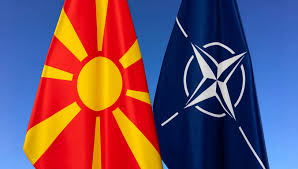North Macedonia Accession to NATO Aims to Maintain Unipolarity in Multipolarity Age

Bulgaria says there is no Macedonian language but rather it is a Bulgarian dialect. There is academic consensus that the Ancient Macedonians were Greek. Albanians claim nearly half of North Macedonia in their project for Greater Albania. North Macedonia is a complex and complicated country, but despite this fact, on Friday, it became NATO’s thirtieth member, with Secretary General of the Alliance, Jens Stoltenberg, saying “North Macedonia is now part of the NATO family, a family of thirty nations and almost one billion people. A family based on the certainty that, no matter what challenges we face, we are all stronger and safer together.”
There was little surprise that U.S. Secretary of State Mike Pompeo expressed jubilation by saying that their membership “will support greater integration, democratic reform, trade, security and stability across the region. North Macedonia’s accession also reaffirms to other aspirants that NATO’s door remains open to those countries willing and able to make the reforms necessary to meet NATO’s high standards, and to accept the responsibilities as well as benefits of membership.” Pompeo is effectively opening the floodgates for more NATO members.
North Macedonia’s accession into NATO marks the completion of one of the key goals of the country since it separated from Yugoslavia, namely the entry into NATO and the European Union. This was made possible by the 2018 Prespa Agreement to end the long-standing name dispute with Greece by changing its name from the “Former Yugoslav Republic of Macedonia” to the “Republic of North Macedonia.” This ended North Macedonian claims to the legacy of the Ancient Macedonians as Article 7 outlines that they “are not related to the Ancient Hellenic civilization, history, culture and heritage.” With the messy name and historical issue with Greece resolved, North Macedonia was given a clear path to join NATO, taking less than two years from the Prespa Agreement to become a full member, and is now being fast-tracked into the European Union. But why was it necessary for North Macedonia to join NATO? Let’s examine what the 30th NATO member brings to the table:
An active military of 8,000 people with 5,000 in reserve.
An air force consisting of 20 helicopters.
No Navy.
An annual military budget of some $150 million.
North Macedonia brings absolutely nothing of material value to NATO. That is because there is no expectation for North Macedonia to bring any great material value to NATO, and rather its geographic location is of interest to the alliance. North Macedonia is to serve as a base against Serbia and Russian influence in the Balkans, in the same way that other NATO members in the Balkans do, as well as Kosovo’s illegal sovereignty. Of Serbia’s eight neighbours, only Bosnia is not a NATO member, but is ruled from the U.S. Embassy in Sarajevo. It is unlikely Serbia will join NATO in the near future as 89% of Serbs are against NATO membership according to a 2019 poll. This makes Greece and Serbia the only two countries in the Balkans where NATO is looked at negatively by the majority of the population, as in North Macedonia for example, 66% of the population wanted to join NATO according to a 2018 poll.
NATO wants to complete the process of encircling Serbia, a Russian ally, and has effectively made Serbia an island in the sea of anti-Russian states. NATO hopes that by encircling Serbia, it can force Belgrade to become pro-Western, something that will never happen since it was the West who orchestrated the collapse of Yugoslavia, bombed Serbia mercilessly in 1999 and protected Kosovo’s illegal independence. North Macedonia’s accession is another piece of the puzzle to encircle Serbia, but it becomes all the more confusing why they choose to play this game considering Skopje must increase their military budget to meet NATO standards when 22% of their citizens live in poverty and their GDP is ranked 130 in the world.
Of course, by joining NATO, North Macedonia will hardly pose any threat to Serbia and Russia, but it does put a psychological impact on Belgrade as it continues to feel pressurized to conform to Western demands and question whether they should abandon their Russian allies. This does not discount though that North Macedonia is now simply another periphery state in a disorganized organization that defends American interests and hegemony around the world. But the mutual defense of NATO means that the organization will have to expand its security umbrella even further. There is a very low risk of North Macedonia being attacked by any of its neighbours though, which suggests that besides being aimed against Serbia and Russia, its membership, like all of the small countries in the alliance, like Estonia and Montenegro, is for the U.S. arms industry who continue to profit by selling weapons to these states under the guise of conforming to NATO doctrine.
As we enter the Multipolar Age, North Macedonia is a unique country as it is wedged between the East and West of Europe. Rather than embracing this new world system emerging, one that is being accelerated into existence because of the coronavirus pandemic, it is going into the comfort of the status quo that attempts to maintain U.S. hegemony.
*
Note to readers: please click the share buttons above or below. Forward this article to your email lists. Crosspost on your blog site, internet forums. etc.
This article was originally published on InfoBrics.
Paul Antonopoulos is a Research Fellow at the Center for Syncretic Studies.

